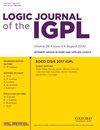The use of logic and argumentation in therapy of sex offenders
IF 0.8
4区 数学
Q2 LOGIC
引用次数: 0
Abstract
Abstract This paper is intended first for the formal argumentation community (see https://comma.csc.liv.ac.uk/). This community develops logics and systems modelling argumentation and dialogues. The community is in search of major applications areas for their models. One such application area e.g. is Law. The message of this paper is that there is another major application area for formal argumentation. There is an international community of sex offender therapist that is well established and well funded, and their therapy methods use (methods that can be modelled by) formal argumentation and logic. This community presents a natural application area for formal argumentation. We thus describe in this paper how the sex offender therapists work, to give the formal argumentation researcher a view of this application area. What is especially important about this application area is that in order to model it and learn from it, the formal argumentation community have to evolve their formal methods and adapt to this new application. Part of this enhancement is to modify and import certain methods from other areas of Logic e.g. from Non-Monotonic logic. The members of the formal argumentation community are not familiar, on average, with other areas of logic, and so we also describe in this paper, what we need from neighbouring logics. This makes this paper of interest also to sex offender therapist as well. They may be already familiar with their own practices, but the additional logics described will be of interest to them.逻辑与论证在性犯罪者治疗中的运用
本文首先是为正式论证社区准备的(见https://comma.csc.liv.ac.uk/)。这个社区开发逻辑和系统模拟论证和对话。社区正在为他们的模型寻找主要的应用领域。其中一个应用领域是法律。本文所要传达的信息是,形式论证还有另一个主要应用领域。有一个国际性的性侵犯治疗师团体,建立良好,资金充足,他们的治疗方法使用(可以模仿的方法)正式的论证和逻辑。这个社区为正式论证提供了一个自然的应用领域。因此,我们在本文中描述了性犯罪者治疗师是如何工作的,以使正式论证研究者对这一应用领域有一个看法。这个应用领域特别重要的一点是,为了对其建模并从中学习,形式化论证团体必须发展他们的形式化方法并适应这个新的应用。这种增强的一部分是修改和导入来自其他逻辑领域的某些方法,例如非单调逻辑。一般来说,形式论证社区的成员对逻辑的其他领域并不熟悉,因此我们在本文中也描述了我们需要从邻近的逻辑中得到什么。这使得这篇论文也引起了性犯罪者治疗师的兴趣。他们可能已经熟悉自己的实践,但是所描述的附加逻辑将会引起他们的兴趣。
本文章由计算机程序翻译,如有差异,请以英文原文为准。
求助全文
约1分钟内获得全文
求助全文
来源期刊
CiteScore
2.60
自引率
10.00%
发文量
76
审稿时长
6-12 weeks
期刊介绍:
Logic Journal of the IGPL publishes papers in all areas of pure and applied logic, including pure logical systems, proof theory, model theory, recursion theory, type theory, nonclassical logics, nonmonotonic logic, numerical and uncertainty reasoning, logic and AI, foundations of logic programming, logic and computation, logic and language, and logic engineering.
Logic Journal of the IGPL is published under licence from Professor Dov Gabbay as owner of the journal.

 求助内容:
求助内容: 应助结果提醒方式:
应助结果提醒方式:


